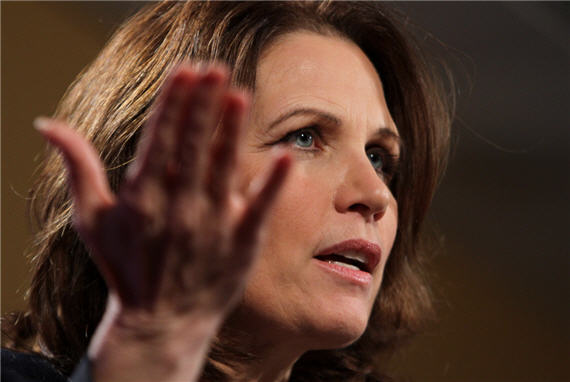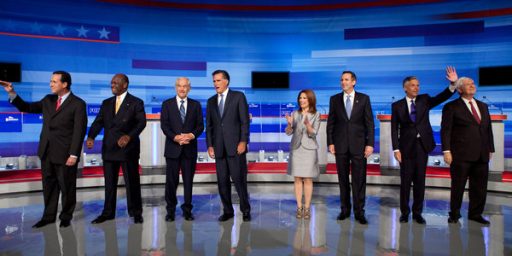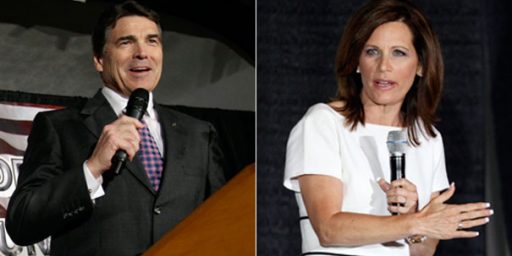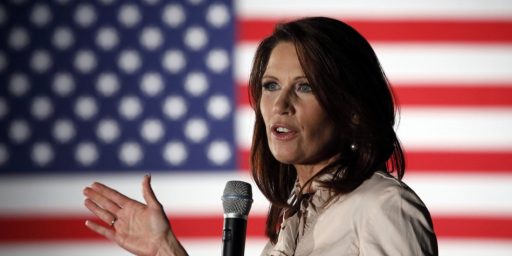Understanding Michele Bachmann
Michele Bachmann is not Sarah Palin.
Michelle Goldberg‘s Daily Beast essay “Bachmann’s Unrivaled Extremism” begins with a rather bizarre anecdote designed to make its subject look creepy. Given the author’s ideological leanings, the lack of sourcing, and the fact that all the Google references to the story link back to this account, I’m skeptical.
Still, the feature presents a very plausible account of who Bachmann is and why she thinks as she does.
Belief is the key to understanding Michele Bachmann, who announced her presidential candidacy during Monday’s Republican debate. Her impressive performance, which catapulted her close to the front of the presidential pack, surprised some, who perhaps expected her to be as inarticulate as Sarah Palin, to whom she’s often compared. But in Minnesota, even those who don’t like her politics say she shouldn’t be underestimated. “The fact that she’s not a heavy lifter, the fact that she’s relatively unconcerned about the substance of legislation, does not mean that she’s not crafty, that she’s not intelligent and she’s not fast,” says former Minnesota Gov. Arne Carlson, a Republican. Her ideological radicalism should not be mistaken for stupidity.
On Monday, Bachmann didn’t talk a lot about her religion. She didn’t have to—she knows how to signal it in ways that go right over secular heads. In criticizing Obama’s Libya policy, for example, she said, “We are the head and not the tail.” The phrase comes from Deuteronomy 28:13: “The Lord will make you the head and not the tail.” As Rachel Tabachnick has reported, it’s often used in theocratic circles to explain why Christians have an obligation to rule.
Indeed, no other candidate in the race is so completely a product of the evangelical right as Bachmann; she could easily become the Christian conservative alternative to the comparatively moderate Mormon Mitt Romney. “Michele Bachmann’s a complete package,” says Ralph Reed, the former Christian Coalition wunderkind who now runs the Faith and Freedom Coalition. “She’s got charisma, she’s got an authentic faith testimony, she’s a proven fighter for conservative values, and she’s well known.”
Bachmann, who was born in Iowa, was in high school in Anoka, Minnesota, when she was swept up in the wave of evangelical Christianity then surging through the country. “People were coming to the Lord left and right,” she said in a recent speech. A pretty cheerleader, she was a member of student government and was elected to the homecoming court. But her family life was unsettled. Her parents divorced in 1970, and her father disappeared from her life and those of her three brothers. When she was in high school, her mother remarried, to a man with five children of his own. Working-class Democrats, the family went to a Lutheran church regularly, but it wasn’t until she was born again at 16, she has said, “that the Gospel finally made sense to me.”
After graduating from high school, Bachmann went to Israel with the evangelical youth group Young Life. Then, at Winona State University, she joined the evangelical Intervarsity Christian Fellowship, where she met her husband, Marcus Bachmann. At the time, the evangelical movement was not particularly political. Indeed, according to Randall Balmer, who is both an evangelical and a historian of American evangelicalism at Columbia University, it was the born again Jimmy Carter who first marshaled the era’s newly awakened Christians. “He brings them into the political arena. There’s no question about that,” says Balmer. “And the great irony is that they turned so rabidly and rapidly against him four years later.”
That’s exactly what happened with Bachmann, who campaigned for Carter in 1976—she and Marcus even went to one of his inaugural balls—but soon tacked sharply rightward. A key moment in her political evolution, as for many of her generation, a was the film series “How Should We Then Live” by the theologian Francis Schaeffer, who is widely credited for mobilizing evangelicals against abortion, an issue most had previously ignored. A Presbyterian minister, Schaeffer argued that our entire apprehension of reality depends on our worldview, and that only those with the right one can understand the true nature of things. Christianity, he argued, is “a whole system of truth, and this system is the only system that will stand up to all the questions that are presented to us as we face the reality of existence.” Theories or assertions from outside this system—evolution, for example—can be dismissed as the product of mistaken premises.
This accounts for some of the bafflement that occasionally greets Bachmann’s statements. “Michele Bachmann says certain things that sound crazy to the general public,” says author Frank Schaeffer, Francis Schaeffer’s son and former collaborator. “But to anybody raised in the environment of the evangelical right wing, what she says makes perfect sense.”
Bachmann honed her view of the world after college, when she enrolled at the Coburn Law School at Oral Roberts University, an “interdenominational, Bible-based, and Holy Spirit-led” school in Oklahoma. “My goal there was to learn the law both from a professional but also from a biblical worldview,” she said in an April speech.
At Coburn, Bachmann studied with John Eidsmoe, who she recently described as “one of the professors who had a great influence on me.” Bachmann served as his research assistant on the 1987 book Christianity and the Constitution, which argued that the United States was founded as a Christian theocracy, and that it should become one again. “The church and the state have separate spheres of authority, but both derive authority from God,” Eidsmoe wrote. “In that sense America, like [Old Testament] Israel, is a theocracy.”
It’s clearly time to reassess the notion that Bachmann is a less famous version of Sarah Palin. Having earned an LLM in tax law from William and Mary, she’s no dim bulb. She’s an incredibly savvy politician who’s spent decades earnestly studying a rather extreme brand of evangelical Christian theology. What most of us were dismissing as gaffes and off-the-cuff nuttiness is, in fact, a sharply honed worldview.







Bachmann is doing well now, when she is preaching to the choir…an empty echo chamber. When she comes up against press other than Fox News we shall see. I flipped to the debate the other night just in time to hear her say that the Tea Party is a diverse group. Right.
heh, maybe she means it’s as diverse as she can handle, norm.
The Tea Party IS a diverse group.
It has Racist Zealots.
It has Anti-Abortion Zealots.
It has have Evangelical Zealots.
Diversity!!!!
I think this is true, if anything because Bachmann can speak in public in English and actually express positions that she has actually thought about.
How frighteningly accurate.
What kind of President would quote or paraphrase the Old Testament?
[pause]
The best President ever?
Well we could look at it, as we lead NATO, instead of follow, but that’s too obvious.
No, clearly
Obama is a secret MuslimBachmann is a secret dominionist.PD, I have no problem with quoting the Bible, but if that quote has the subtext that Goldberg(?) claims, that Christians should be out there ruling the infidels, I recoil.
PD, there are quite a few articles on Bachmann and dominionism, going back years, aren’t there?
As if there was someone who was governing, as if he followed his church’s precept, like say,
title his memoir based on his pastor’s most famous sermon,
jp, all the linked articles use to support Bachmann as dominionist are “dog whistles,” statements that have secret meanings to fellow dominionist.
Elaine: Perhaps there’s more to (Newman) than meets the eye.
Jerry: No, there’s less.
Elaine: It’s possible.
Jerry: No it isn’t. I’ve looked into his eyes. He’s pure evil.
David Barton, the quack historian favored by Bachmann, Huckabee, and Perry to argue against separation of church and state, also has a religious degree from Oral Roberts. Oral Roberts has a poor reputationin the broader Christian community.
PD, some may be making false alarms, no doubt.
It mainly interests me to the extent that the evangelical right have been Mideast hawks. For a time there was a linkage there. I saw it building off the evangelical tendency to narrow the gap between civil and private religion.
It’s one thing to observe a Christian nation, and it’s another to demand a Christian nation.
Anyway, I’m informed on the radio this morning that the Tea Party is tipping isolationist, which would much reduce my concern.
And of course, if a Mormon could win the Republican nomination, that would say that the old view of public religion is not so dead, afterall.